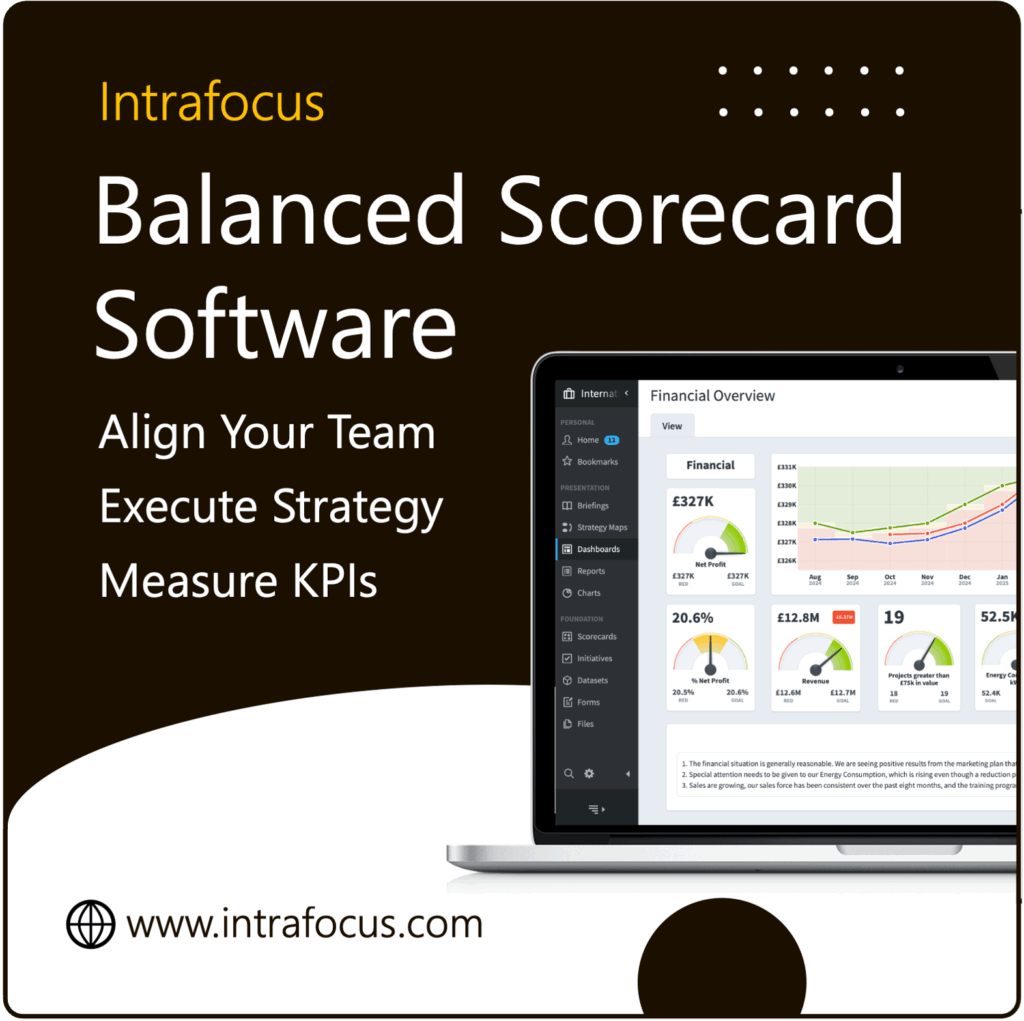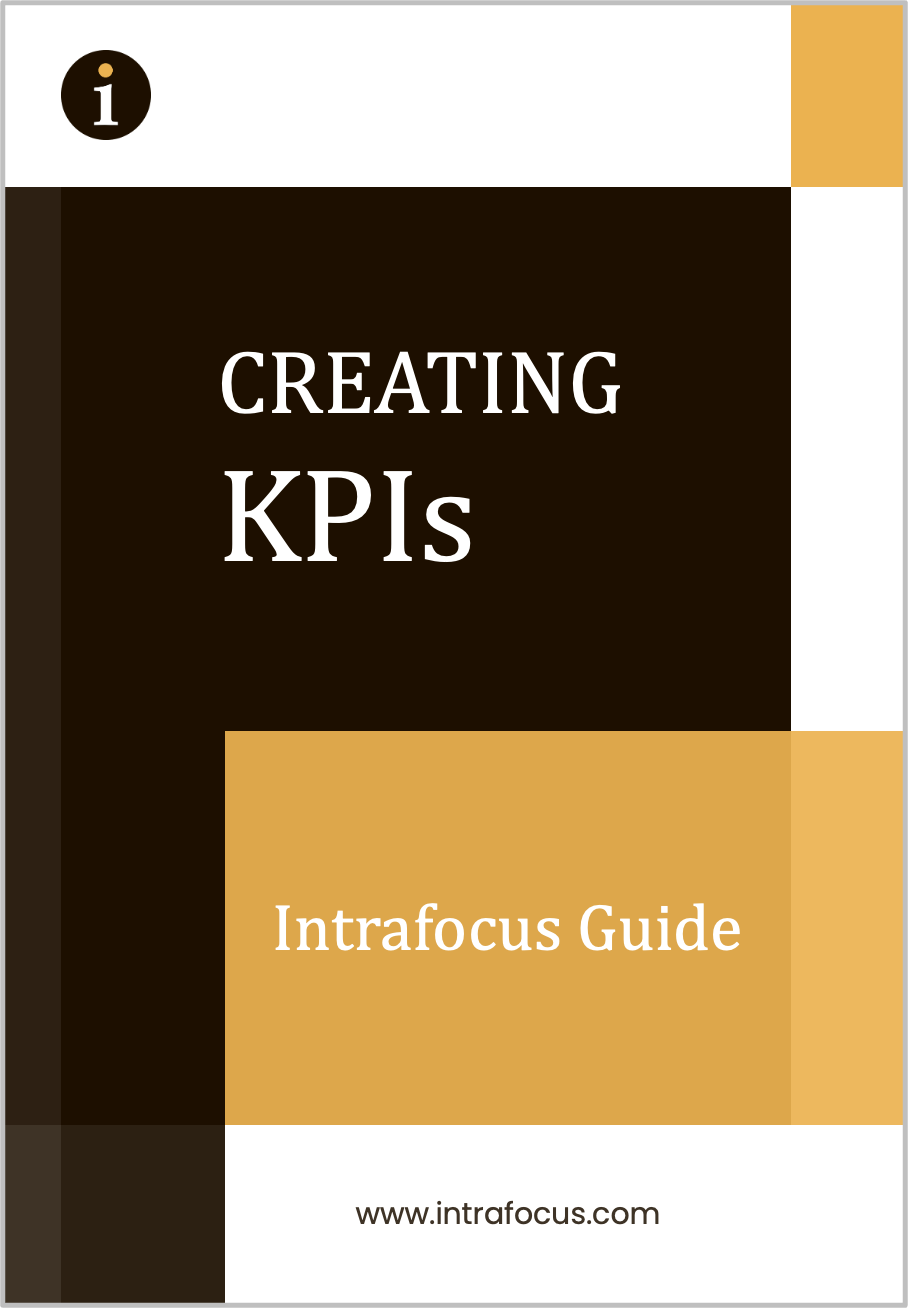Staying ahead of the pack requires more than tracking financial metrics. This is a Balanced Scorecard Overview (BSC), a revolutionary tool developed by Drs. Robert Kaplan and David Norton. Imagine having a comprehensive dashboard that monitors your financial health and keeps a pulse on customer satisfaction, internal processes, and your team’s growth and innovation. That’s precisely what the BSC offers.
Why should the BSC be on your radar? It revolutionises the way businesses approach performance. Traditional methods often overlook crucial aspects like customer loyalty or operational efficiency, focusing narrowly on financial results. The BSC shatters this approach by integrating four perspectives: Financial, Customer, Internal Processes, and Learning and growth—providing a comprehensive and balanced view of your organisation’s performance.
Think of the Balanced Scorecard as your strategic compass. It aligns everyday activities with your long-term vision, ensuring everyone in the organisation is rowing in the same direction. This alignment clarifies goals, enhances communication, and fosters a culture of continuous improvement.
Get ready to delve into the origins and significance of the BSC, understand its core components, and get a sneak peek of what’s to come in this series. Whether you’re a seasoned executive or new to strategic management, this guide is your compass to navigate the complexities of today’s business landscape. Are you prepared to revolutionise your approach to performance measurement?
What is the Balanced Scorecard?
The Balanced Scorecard (BSC) is a strategic planning and management system designed to help organisations translate their vision and strategy into actionable objectives and measurable goals. It moves beyond traditional financial metrics to provide a more comprehensive view of organisational performance. By integrating four key perspectives: Financial, Customer, Internal Processes, and Learning & Growth—the BSC ensures a balanced approach to performance measurement, addressing both short-term financial outcomes and long-term strategic goals.
The BSC’s primary role is to align business activities with the organisation’s vision and strategy. This alignment helps communicate strategic objectives clearly across all levels of the organisation. It ensures that every department and employee works towards common goals. By doing so, the BSC enhances internal communication and performance monitoring. It fosters a culture of continuous improvement and strategic alignment.
Historical Context
The Balanced Scorecard was developed in the early 1990s by Drs. Robert Kaplan and David Norton. They recognised that traditional performance measurement systems focused solely on financial metrics and were inadequate for capturing the complete picture of organisational performance. These systems often overlook critical non-financial factors essential for long-term success, such as customer satisfaction, internal processes efficiency, and organisational capacity for learning and growth.
Kaplan and Norton introduced the BSC to address these limitations. They proposed a framework integrating financial measures with other key performance indicators across four perspectives. This holistic approach allows organisations to monitor and manage performance more effectively, ensuring that financial success is balanced with other critical success factors. The BSC quickly gained popularity and has since been adopted by organisations worldwide as a robust strategic planning and performance management tool.
By offering a balanced view that encompasses financial and non-financial measures, the Balanced Scorecard has become an invaluable tool for organisations aiming to achieve sustainable success in an increasingly complex business environment.
Relevance Today
Balanced Scorecard Overview
In today’s fast-paced and ever-evolving business environment, organisations face numerous challenges. Rapid technological advancements, global competition, and shifting market dynamics require businesses to be agile and adaptable. These complexities make it challenging to rely solely on traditional performance metrics, which often focus narrowly on financial outcomes.
Modern businesses need tools that provide a comprehensive view of performance. This holistic approach ensures that all critical aspects of the organisation are monitored and managed effectively. A balanced perspective allows companies to identify and address issues in real time, fostering a proactive rather than reactive management style.
Why the Balanced Scorecard Matters
The Balanced Scorecard (BSC) remains highly relevant in addressing these modern challenges. Unlike traditional performance measurement systems focusing solely on financial results, the BSC integrates financial and non-financial measures into a single framework. This comprehensive approach helps organisations track and achieve their strategic goals more effectively.
The BSC’s inclusion of four perspectives—Financial, Customer, Internal Processes, and Learning & Growth—ensures that businesses do not overlook essential areas contributing to long-term success. For instance, focusing on customer satisfaction and internal process efficiency can lead to improved financial performance. Similarly, investing in employee development and innovation under the Learning & Growth perspective ensures that the organisation remains competitive and capable of adapting to changes.
The Balanced Scorecard is versatile and can be applied across various industries and organisational types. Whether in healthcare, manufacturing, education, or non-profit sectors, the BSC provides a structured approach to strategic management. For example, a healthcare provider might use the BSC to balance patient care quality with operational efficiency and financial health.
By offering a balanced view of performance, the BSC helps organisations align their activities with their strategic vision, improve communication, and foster a culture of continuous improvement. In doing so, it equips businesses to navigate the complexities of the modern business landscape and achieve sustainable success.
Overview of the Four Perspectives
The Balanced Scorecard (BSC) stands out due to its comprehensive approach to performance measurement, encapsulated in its four perspectives: Financial, Customer, Internal Processes, and Learning & Growth. Each perspective provides a unique lens to view and evaluate organisational performance, ensuring a balanced and holistic approach.
Financial Perspective
The Financial Perspective focuses on high-level financial objectives and measures, such as revenue growth, profit margins, and return on investment (ROI). It answers the question, “How do we look to our shareholders?” While financial metrics are crucial for assessing an organisation’s economic health, they only provide a partial view of overall performance. By integrating financial measures with other perspectives, the BSC ensures that financial success is balanced with other critical success factors.
Customer Perspective
The Customer Perspective emphasises customer satisfaction, retention, and market share. It addresses the question, “How do our customers see us?” This perspective is vital because customer satisfaction and loyalty are key drivers of long-term success. By measuring and understanding customer needs and perceptions, organisations can tailor their products and services to better meet those needs, enhancing customer loyalty and driving growth.
Internal Processes Perspective
The Internal Processes Perspective evaluates the efficiency and effectiveness of internal business processes. It asks, “What must we excel at?” This perspective focuses on the critical internal operations that enable the organisation to deliver value to its customers. By identifying and improving key processes, organisations can reduce costs, improve quality, and increase operational efficiency, leading to better overall performance.
Learning & Growth Perspective (or Organisational Capacity)
The Learning & Growth Perspective assesses the organisation’s ability to innovate, improve, and learn. It explores the question, “Can we continue to improve and create value?” This perspective includes employee training, culture, and leadership development, ensuring that the organisation has the capabilities needed for long-term success. Investing in learning and growth helps build a skilled and motivated workforce, fosters innovation, and ensures that the organisation can adapt to changes in the market and environment.
These four perspectives work together to provide a balanced view of performance. By integrating financial and non-financial measures, the BSC helps organisations align their activities with their strategic vision, improve internal and external communication, and foster a culture of continuous improvement. This comprehensive framework ensures no single area is overlooked, enabling organisations to achieve sustainable success in a complex and dynamic business environment.
Impact and Benefits
Strategic Alignment
The Balanced Scorecard overview (BSC) aligns business activities with an organisation’s vision and strategy. By translating strategic objectives into specific, measurable goals across four perspectives—Financial, Customer, Internal Processes, and Learning & Growth—the BSC ensures that the organisation works towards the same overarching aims. This alignment is crucial for maintaining a coherent strategy where every department and employee understands their role in achieving the company’s goals. It creates a clear roadmap, linking daily operations to long-term strategic outcomes, which enhances focus and efficiency throughout the organisation.
Improved Communication
One of the significant benefits of the Balanced Scorecard is its ability to improve communication and understanding of strategic goals across the organisation. The BSC provides a common language for discussing strategy and performance, breaking down silos and fostering collaboration. By clearly outlining the objectives and how they will be measured, the BSC helps ensure everyone, from top management to frontline employees, is on the same page. This enhanced communication facilitates better decision-making and ensures all team members are aligned and motivated to achieve the organisation’s goals.
Performance Monitoring
The BSC offers a structured approach to monitoring and managing performance. By integrating various performance measures across its four perspectives, the BSC allows organisations to track progress in real time and identify areas needing improvement. This comprehensive view enables managers to make informed decisions based on a balanced set of metrics rather than relying solely on financial data. The ability to monitor performance across different dimensions helps organisations stay agile and responsive to changes in the business environment, driving continuous improvement.
Case Study Examples
Numerous organisations have successfully implemented the Balanced Scorecard to drive strategic outcomes. For example, healthcare providers have used the BSC to balance financial performance with patient care quality and operational efficiency. Companies like Hilton Hotels have leveraged the BSC to enhance customer satisfaction and internal processes, improving financial results. Similarly, the U.S. Department of Defense adopted the BSC to align its vast operations with strategic goals, enhancing overall performance and accountability.
These examples illustrate how the BSC can transform an organisation’s approach to strategic management, ensuring that all activities are aligned with long-term goals, communication is clear, and performance is continuously monitored and improved. The Balanced Scorecard’s holistic and integrated framework makes it invaluable for achieving sustainable success in today’s dynamic business environment.
Overview of the Upcoming Articles
In the following articles, we will delve deeper into various aspects of the Balanced Scorecard, exploring its practical applications, benefits, and future trends. Here’s what you can look forward to:
Preview of Article 2: The Four Perspectives of the Balanced Scorecard
In this article, we will explore the four perspectives of the Balanced Scorecard: Financial, Customer, Internal Processes, and Learning & Growth. We will provide practical examples and implementation tips for each perspective, showing how they collectively offer a balanced view of organisational performance. This article will help you understand the intricacies of each perspective and how to leverage them for strategic success.
Preview of Article 3: The Impact of AI on the Balanced Scorecard
Artificial Intelligence (AI) is transforming strategic management and performance measurement. This article will explore how AI can enhance the Balanced Scorecard framework by providing advanced data analytics, predictive insights, and automation. We will discuss real-world applications and how organisations can integrate AI with the BSC to drive better decision-making and performance.
Preview of Article 4: Success Stories: Balanced Scorecard in Action
Success stories provide powerful insights into the practical benefits of the Balanced Scorecard. This article will feature case studies of companies that have achieved significant improvements using the BSC. These examples will illustrate how diverse organisations have implemented the BSC to effectively align their strategies, improve communication, and monitor performance.
Preview of Article 5: The Top 7 Things to Keep in Mind When Developing a Balanced Scorecard
Developing a Balanced Scorecard involves careful planning and consideration. This article will outline the top seven things to remember for successful BSC development and implementation. From strategic alignment to stakeholder engagement, these tips will help ensure your BSC is effective and sustainable.
Preview of Article 6: Implementing the Balanced Scorecard: A Step-by-Step Guide
Implementing the Balanced Scorecard can be a complex process. This article will provide a practical, step-by-step guide to help you through it. We will cover preparation, design, rollout, and ongoing management, offering best practices and actionable steps to ensure success.
Preview of Article 7: Future Trends in Balanced Scorecard and Strategic Management
The final article in the series will discuss emerging trends in Balanced Scorecard and strategic management. We will explore topics such as sustainability, ethics, and the evolving role of technology. Additionally, we will provide expert predictions on the future of the BSC, helping you stay ahead of the curve in strategic management.
Stay tuned for these insightful articles that will deepen your understanding of the Balanced Scorecard and its transformative potential for your organisation.
Importance of the Balanced Scorecard
The Balanced Scorecard remains a crucial tool for modern organisations. By integrating both financial and non-financial measures, it provides a comprehensive framework for performance management. The BSC helps align business activities with strategic goals, improves communication, and offers a structured approach to performance monitoring. Its versatility makes it applicable across various industries, enabling organisations to achieve balanced and sustainable success.
As we conclude this introduction, we invite you to stay tuned for the upcoming articles in this series. Each article will delve deeper into different aspects of the Balanced Scorecard, providing practical insights and real-world examples to help you implement the BSC in your organisation. To enhance your strategic management efforts, consider exploring our Balanced Scorecard Software. This tool can streamline your performance measurement processes and drive strategic alignment.
Final Thoughts
Balanced Scorecard Overview – The landscape of strategic management is continuously evolving, with new challenges and opportunities emerging regularly. The Balanced Scorecard, with its holistic and integrated approach, remains a vital tool for navigating this dynamic environment. As organisations strive for excellence, the BSC provides a roadmap for aligning vision and strategy with everyday operations. Embrace this powerful tool to drive your organisation towards sustained success and adaptability in an ever-changing business world. Stay engaged with this series to unlock the full potential of the Balanced Scorecard and revolutionise your strategic management practices.



